The Revolution is Measured
Benchmarks
The big problem for gamers with the Revolution 7.1, and any other Envy24HT powered sound card for that matter, is that it doesn't have DirectSound acceleration. Well, the difference is typically a 5-7% performance drop from the Audigy2. If you can tell a 10 frame difference with a game running at 120fps, please email me. Just so I can tell you that you're nuts.
With upcoming games like Doom3 and Half-Life 2 just a few months away, the lack of DirectSound acceleration may be a serious consideration for a gamer. Trading off excellent sound for game performance (or benchmark numbers) doesn't work for me, but a hard-core gamer just might find it unacceptable. In any event, one or two iterations of Moore's Law should fix Doom3's prodigious need for a fast system.
For CPU utilizations I used AudioWinBench99, a benchmark that's long in the tooth, but valid as long as it's compared to the other results. Lower numbers are better.
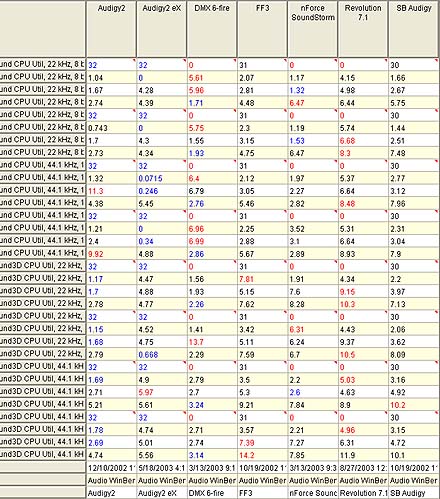
The Revolution 7.1 scored second to last, about as good as the original Creative Audigy. Of course the Audigy is doing more work, providing more effects with the EAX 3.0.
I was a little disappointed by the RMAA 5.1 scores. The Revolution 7.1 sounded much, much better than what RMAA measured. Perhaps my cables (Radio Shack, gold plated, woohoo) developed a funk. I think it is safe to say, these values will be the very least you can expect to get from the Revolution. These are 24 bit/96kHz numbers.
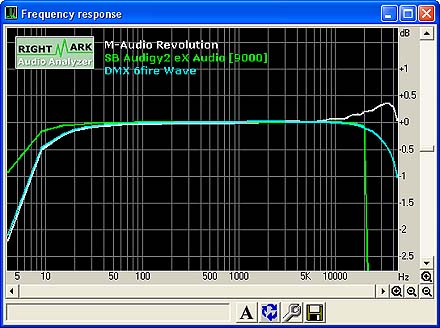
The Audigy2 eX is the RMAA champion for guru3d.com, but you can clearly see the advantage of the Envy24/AKM combination at work. The Revolution 7.1 has a very wide and flat frequency response of +0.14 to -0.07dB from 40Hz to 15kHz, peaking at about 35kHz, well above the range of human hearing. M-Audio quotes a -3dB point around 80kHz. I have no reason to question their results. A flat frequency response is better.
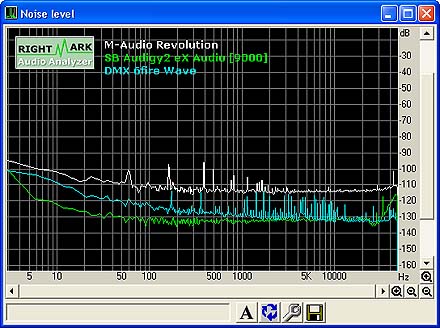
Noise levels are clearly higher for the Revolution 7.1 at -81.2dB (A-weighted). But the noise itself is relatively artifact free, having few harmonics above 2kHz, which is excellent. I just wish the level was lower. This is much worse than the printed spec of -107dB.
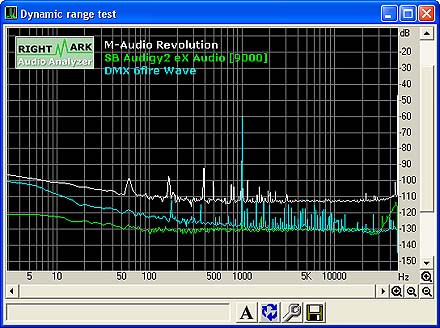
Dynamic range, while not the best, is still a good 80.9dB (A-weighted). Again, worse than the specified 106dB.
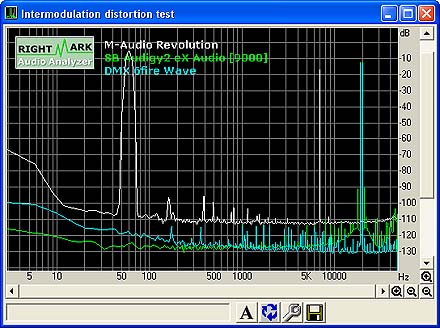
RMAA 5.1 has a new IMD test, playing back a 60Hz+7000Hz test tone. The Revolution clocked in at 0.039% IMD, which is good, but not great. Ideally, you want no extra spikes other than the test tones. Previous versions of RMAA used a punishing 19+20kHz test tone. It sort of makes the previous results invalid, but I didn't have the eX on hand to retest. The DMX 6-fire produced results that were even better with the new test.
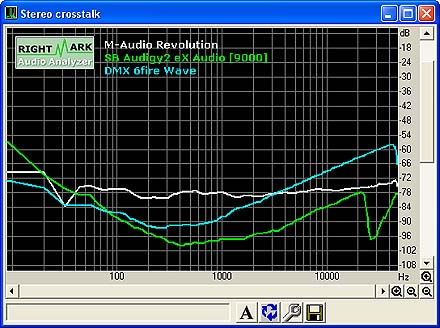
Stereo Crosstalk is at -80.7dB for the Revolution 7.1, not stellar, but not bad either. It is flat across the frequency range, which is what I like to see. This is far worse than the -120dB M-Audio specifies for the Revolution's crosstalk.
With mediocre scores in CPU DirectSound utilization, and a 'very good' RMAA 5.1 assesment, the Revolution 7.1 is a little worse than expected. However, it sounded much better than it measured with RMAA, which is why I like to listen first and then measure.
